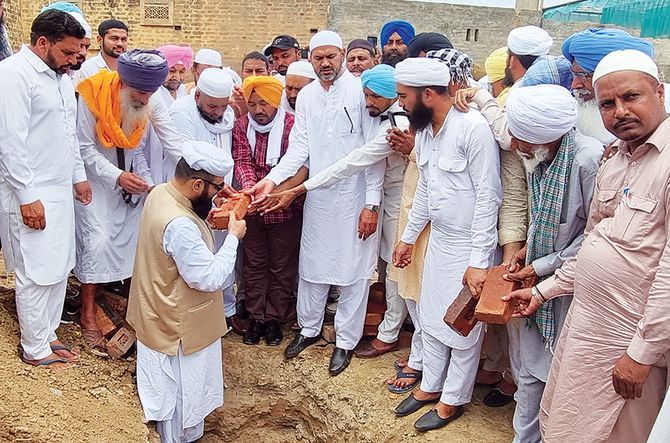
It takes a village to build a mosque in this remote Indian district
NEW DELHI: Residents of a predominantly Sikh and Hindu village in a remote district of India’s Punjab state have joined hands to build a mosque for Muslim families in the area, in a message of community spirit and harmony amid growing concerns over rising religious tensions in the country.
The Bhaloor village of 12,000 people, located in Punjab’s Moga district, has seven gurdwaras as well as two temples, but lacks a mosque for its 20 Muslim residents.
Village head Pala Singh told Arab News that an old mosque existed in the area before the partition in 1947, when the British colony of India was divided into the separate countries of Pakistan and India.
However, the condition of the mosque deteriorated after many Muslim residents left the village.
“After the partition, most Muslim families left for Pakistan and the mosque went into ruins after that. The new mosque will be built on the same land,” Singh, 45, said, adding: “We are proud to be part of this initiative.”
On Sunday, village officials laid the foundation stone for the Mohammadi mosque, with people from all faiths attending the ceremony.
“Some people donated RS200,000 ($2,800) at the venue itself and more help was assured,” Anwar Khan, head of the mosque’s managing committee, told Arab News, adding that many nonresident Indians from Punjab had also pledged support for the mosque.
Khan, 32, said that plans to build the new mosque had been in place “for quite some time,” with construction expected to be completed by next year at a total cost of $17,000.
“But I think the opportune time has come now. We are a close-knit village, people respect all religions, and the mosque would not have been possible without the emotional and moral support of the villagers,” he said.
“It’s an example of communal harmony at a time when we hear all kinds of disturbing news about religious violence,” he added.
Punjab’s chief Muslim cleric, Shahi Imam Maulana Mohammad Usman Rahmani Ludhianvi, was among the top religious figures who attended Sunday’s event.
“The day the foundation ceremony took place it was written in golden letters in history, because the whole village and the local gurdwara associated themselves with the event,” he said.
“The mosque is the reflection of the love of the villagers,” Ludhianvi said, adding that Sikhs and Muslims share a “very close historical bond,” and that “a true Sikh and a true Muslim never harm each other.”
The Hindu nationalist Bharatiya Janata Party, which has been in power since 2014, has been accused of promoting communal politics in several states in north India, dividing communities along Hindu-Muslim lines.
Last month in Uttar Pradesh’s Barabanki district, the local administration destroyed a century-old mosque, claiming that it “never existed.”
In another incident in the same state, Muslim families who had lived in the vicinity of a temple for more than a century were asked to vacate their ancestral homes “for security reasons.”
Village head Singh said: “The rest of the country needs to take a lesson from us.
“Punjab has a history of communal harmony, and we felt that Muslim families too have the right to offer their prayers in their religious place.”
SOURCE: https://www.arabnews.com/node/1878046/world

